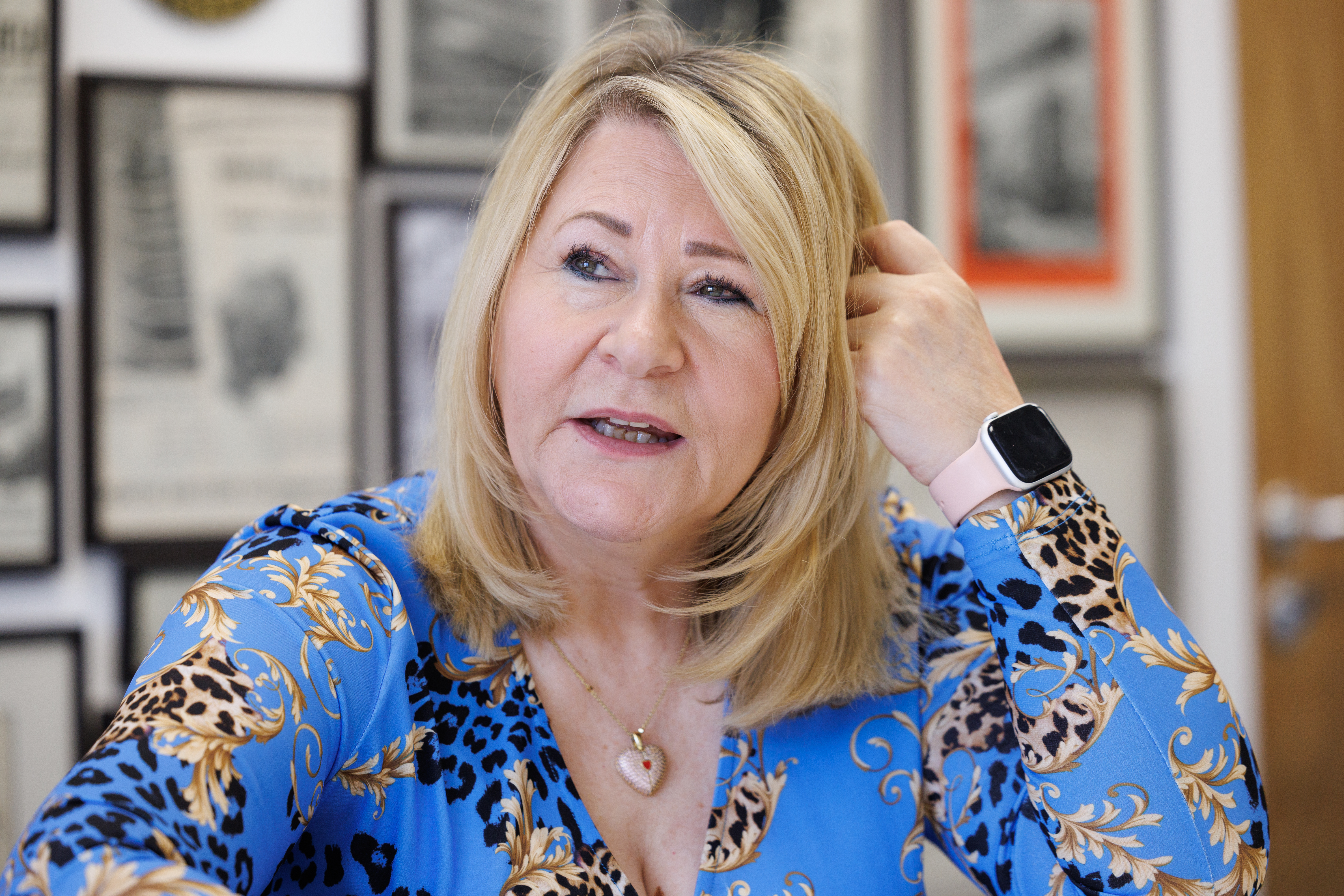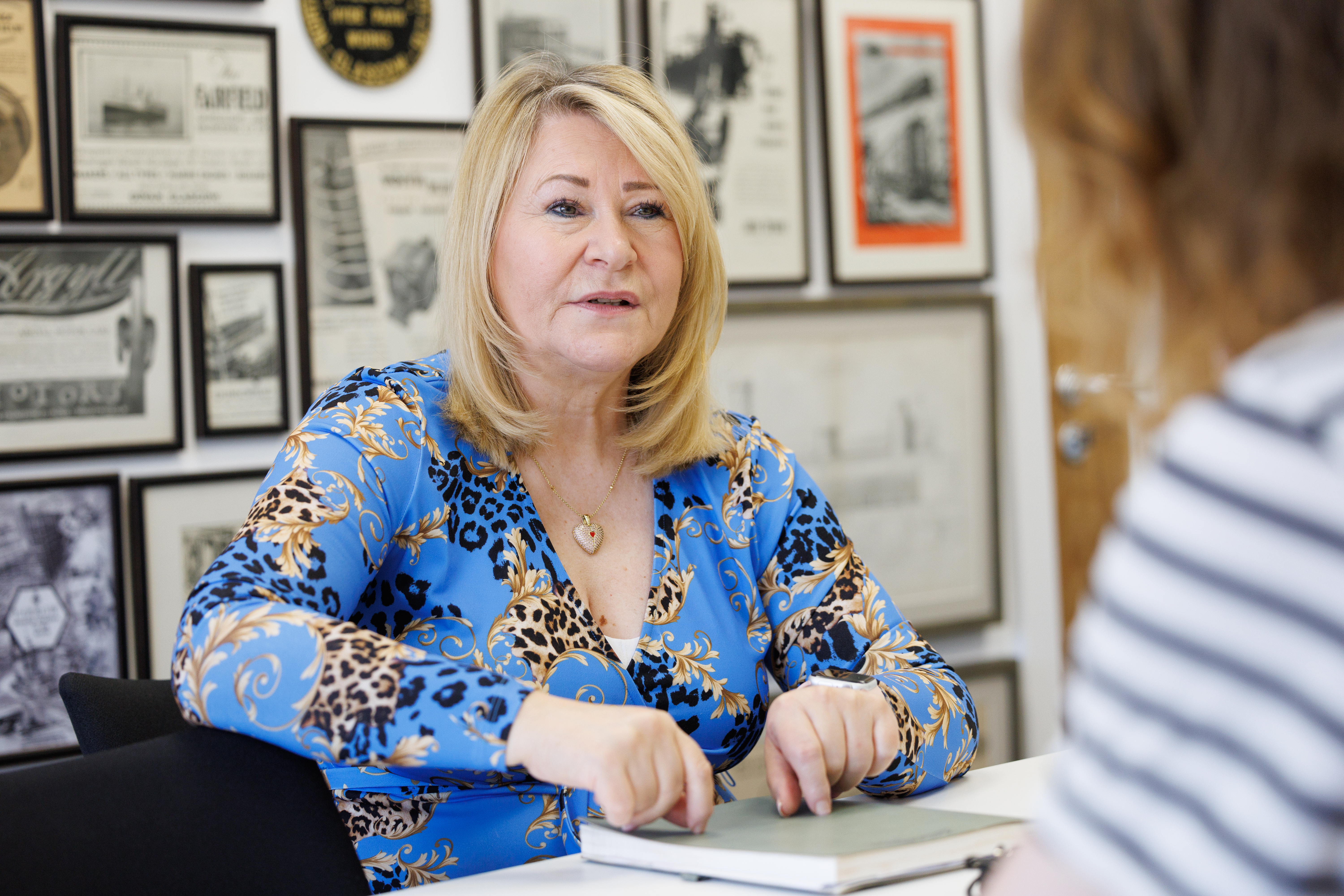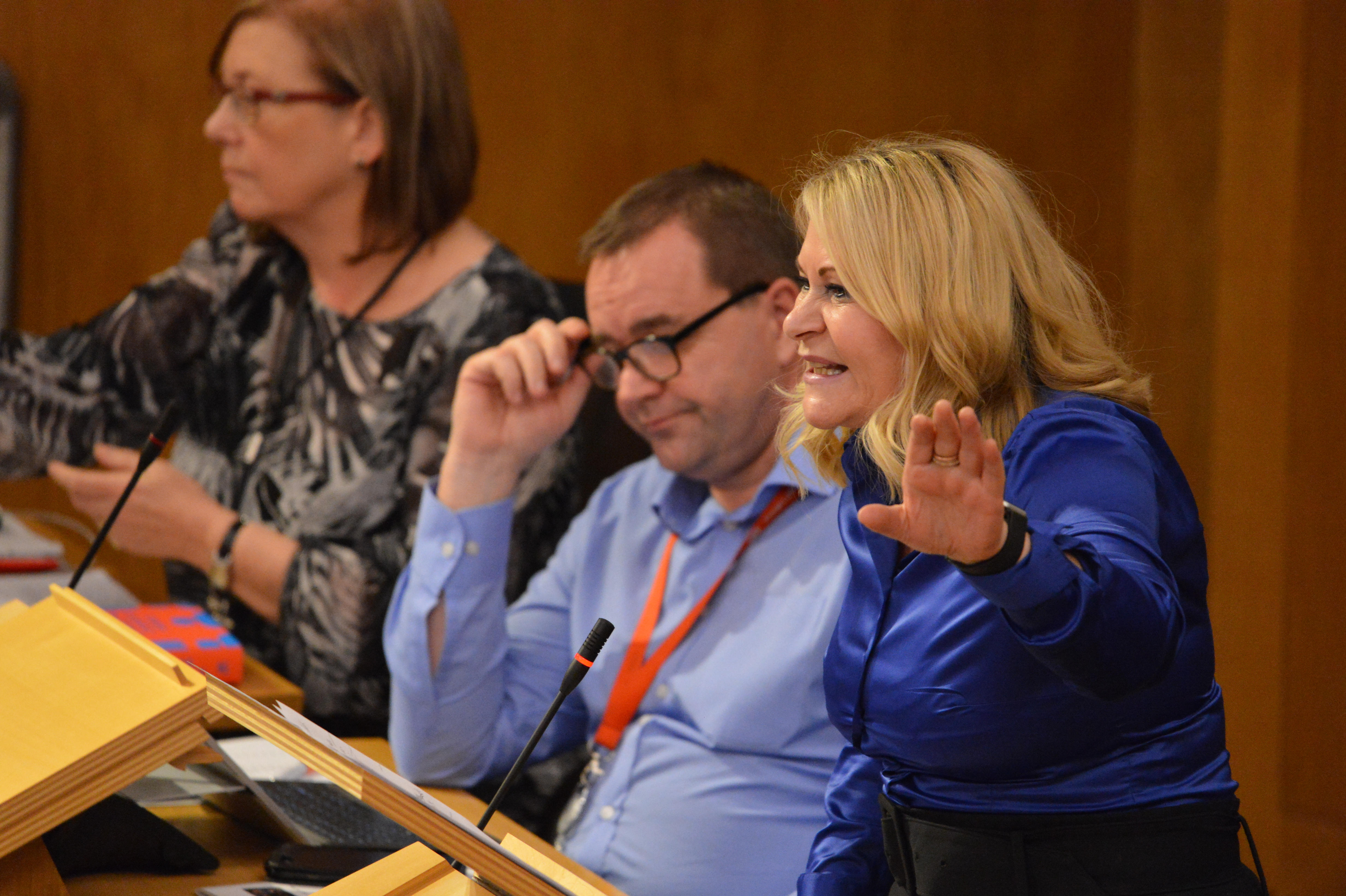Pauline McNeill: Politicians don't get it – the Reform surge isn't just about immigration
The woman who hopes to be the next justice secretary does not envy the job of the current justice secretary. It is, Pauline McNeill says, a tough gig, involving a lot of complexities and careful balancing.
Take the problems facing Scotland’s prisons. Overcrowding has become a serious issue, with the average number of people behind bars at any one moment exceeding 8,300 last year – about 300 more than there are spaces. HMP Barlinnie, in particular, is in a “wretchedly poor state” according to the HM Inspectorate of Prisons for Scotland.
McNeill, a Labour MSP for Glasgow and the party’s justice spokesperson, says: “When we hold people in jail, there’s got to be humane conditions. Doubling people up in Barlinnie, it’s just unacceptable to me. I’ve actually heard that in some cases they’re tripling up people.
“If you want to rehabilitate them, you can’t be locking them up 23 hours a day and shoving them in with another prisoner… A lot of them are saying that they want to go on rehabilitation but they can’t get on the programmes.
“The prison debate is a really complex one that is more about alternatives [to custodial sentences]. But also you’ve got to spend some money on rehabilitation if you want to stop the revolving door.
“I wouldn’t pretend being justice minister is an easy job. It’s really hard to change from the status quo.”
No one’s pretending it’s easy, but you must have at least an idea about what needs done
It’s an interesting little window into the current thinking of Scottish Labour politicians. They know that, if they were to enter government next year, it’ll be a lot of work to move away from what McNeill calls “crisis management” and towards long-term solutions.
“When the problems start stacking up and get more acute, it’s so much harder to get out of it,” she says. “No one’s pretending it’s easy, but you must have at least an idea about what needs done.” Her party, she insists, is up for the challenge.
Yet while it was not that long ago it looked like Labour should start preparing for government, that all now seems a distant dream. Since winning the general election in July last year, the Labour UK Government has made a series of decisions which have hammered its popularity both north and south of the border. Gains made by the Scottish party have been reversed and a Survation poll published this month even had it behind Reform.
McNeill says: “There is no doubt that decisions made by UK Labour have impacted not just on Scottish Labour, it has impacted on the popularity of the Labour government. And no allowance is made for the Labour government having inherited lots of big problems. Decision-making is not easy for a new government in that situation.

“But there’s no doubt it’s had a big impact on our prospects. You can see that in the polls. But a year is still a long time in politics, and I think the focus will be more on will the voters want another term of the same government or will they say it’s time for another government? The focus as we get into it will switch, hopefully, to what people are being asked to decide on, which is who’s going to run Holyrood.”
That tricky need to balance support for the UK party while also establishing a distinct Scottish voice has been a circle Scottish Labour has never quite managed to square. McNeill, who was a member of the Campaign for a Scottish Assembly long before it became Labour policy in the 90s, says it is “frustrating” that despite being the party of devolution, “we’re still fighting for that space”.
“It’s like, 25 years on from devolution, we’re still saying ‘we are a different parliament, we have different powers and we exercise our right to say something different from the UK party’, but whether that cuts through, I don’t know.”
If you characterise it as purely people are fed up with immigration, then I think you don’t get it at all
As for recent problems, she’s honest that she’s not always been terribly impressed with decisions from Downing Street. In particular, she takes aim at the winter fuel allowance decision, describing it as “wrong”. She is not, of course, an outlier in her party on this. When a motion came to Holyrood urging the UK Government to reverse that policy, McNeill was one of five Labour MSPs not present for the vote, while two of their number voted with the SNP.
If opinion polls had not been enough to prove how disillusioned voters are with the Labour government, then the recent English local elections will have been. Reform gained hundreds of councillors in both Conservative and Labour strongholds, and even where it didn’t win it performed strongly. McNeill hopes her party does not learn the wrong lesson.
“The first thing is to understand exactly why people are turning to a non-mainstream political party. If you characterise it as purely people are fed up with immigration, then I think you don’t get it at all,” she explains.
Asked whether she, a self-described socialist, worries that her party will shift to the right to prevent further losses to Reform, she argues its not about left and right for most people. “I think it doesn’t really matter where you position yourself in British politics, what should centre the Labour Party is making decisions which are right for the country and don’t expose the most vulnerable people to hardship,” she says.

“I do appreciate that a Labour government, having inherited a complete mess, could not have done everything. It was always going to be hard to accept that.
“But I do think that where we are in British politics now is about trying to understand what it’s like for most ordinary people – and not just the poorest people, it’s middle income earners, people that haven’t had a pay rise, people that don’t have a union, even people who have had pay rises but seen it completely eaten up by their energy bills going up and so on.
“People feel that everywhere they turn they’re getting hammered for more money and less service. It doesn’t really matter where you are on the left or right for most issues, it’s about making decisions that set the economy on the right track, that’s going to benefit the vast majority of people.”
It is this growing pressure on households that is the driving force between Reform’s dramatic rise, she says, so she doesn’t think it’s helpful to ignore or dismiss the threat. “I don’t think you can fight Reform by simply calling them extremists. You fight Reform by coming up with policies and ideas and speaking to people to try to understand that they feel the political system has failed them.
“You can say it’s a protest vote, and I’m sure that it is. How long it will last, we don’t know. But it’s a big message to mainstream political parties, to everyone. I think the answer lies in absolutely understanding how we got here.”
It’s hard to stay completely connected because you are a politician. I valued the time out
Beyond diagnosing the issue, the treatment is “fixing the basics”. That doesn’t mean fixing everything all at once, McNeill says, but ensuring “police will turn up when there’s a crime committed” or making it easier to get a GP appointment will demonstrate to voters that politicians can bring about positive change.
“Where people think ‘that’s a great idea, but it’s not going to be delivered’, that’s where you’ve got problems. It is all about the convincing,” she adds.
She hopes Scottish Labour will do enough over the next 12 months to convince people. “I think we’re ready for it,” she says. But, she adds, “we’ve just got to hope as well that people will focus on the decision they’ll be making in ‘26 isn’t about whether Keir Starmer’s in office.”
Her point about focusing on “ordinary people” is going to be Labour’s big pitch. She’s acutely aware of the dangers of getting wrapped up in the Holyrood bubble – in part because she was in the bubble for more than a decade before, suddenly, she wasn’t.
 McNeill in the chamber in 2019, alongside former MSPs Neil Findlay and Elaine Smith | Alamy
McNeill in the chamber in 2019, alongside former MSPs Neil Findlay and Elaine Smith | Alamy
Elected in 1999 – having been persuaded by George Galloway, then the local Labour MP, to run – she remained in parliament until 2011, when she lost her Glasgow Kelvin seat to the SNP. And while that was hard at the time, she’s grateful now for the time away and the new perspective it gave her.
“I felt I’d served my time and I felt I could actually have a life outside of politics, which I did, and it has given me that perspective which I value because I do think I see things quite a bit differently to other people. Clearer than I would have.
“You are in a bubble, that no one can deny, whatever party you’re from. It’s hard to stay completely connected because you are a politician. I valued the time out because it gave me time to talk to family and friends, do things I never did before, and then come back in and maybe try and do things a bit differently.”
Reflecting on those earlier years and being part of the parliament she had long campaigned for, she says she was “very, very privileged” to see it all first-hand. And despite reservations about coming back in 2016 – she had to be convinced to do so by Anas Sarwar – being an MSP suits her nature.
“It probably is in your blood. I started out as a union official, and I was very cut out for that. I was 23, joined the GMB and I was known for being an absolute terror to employers. I was young and I became the first woman who represented all the officers in a male-dominated union. That was quite significant because they trusted me with their pay. When you’re young, you know, you’re not frightened of anything. I was falling out with the bosses, but representing people is what I did. I fought for people.”
If you’re really serious and want to tackle misogyny, you’ve got to look at the behaviour of boys
It’s that same fire that keeps her going now. And one source of fuel for her going forward will be tackling violence against women and girls, whether she’s in government next May or not.
She says she was “speechless” when the Scottish Government earlier this month announced it was shelving the planned Misogyny Bill. While she had not been totally convinced that a separate piece of legislation was necessary – she favoured adding protections on the basis of sex to the Hate Crime Bill and lodged amendments to that affect – she describes the government’s announcement as “one of the worst things” they’d done.
“It’s really insulting to the work of Baroness Kennedy. I don’t buy that it’s too complicated – that is nonsense, utter nonsense. This is because they didn’t plan properly to get an important bill through parliament and now they’ve run out of time.”
Moving forward, however, she says there needs to be less focus on legislation and more on encouraging behavioural change. “If you’re really serious and want to tackle misogyny, you’ve got to look at the behaviour of boys.” She calls for properly resourced, “cross-cutting work” in education and with young people.
I wonder if, back in ’99, she ever thought this would still be an issue that plagues society. The answer is an emphatic “no”.
“No, I never would have thought that violence against women and children would continue to go up. I wouldn’t have thought that 70 per cent of the cases in the High Court would be violence against women and girls. I wouldn’t have thought, as I have done going into schools, that sixth year girls are talking about the behaviour of boys. And of course you couldn’t predict in ‘99 the advent of social media and the impact that’s had…
“Maybe if we’d actually focused in on [men’s behaviour] sooner, then we wouldn’t be here. But we didn’t. We focused too much on unnecessary law change, policy change, not behaviour. It’s not an easy thing to do, but it is the answer. It’s the only answer.”
Holyrood Newsletters
Holyrood provides comprehensive coverage of Scottish politics, offering award-winning reporting and analysis: Subscribe